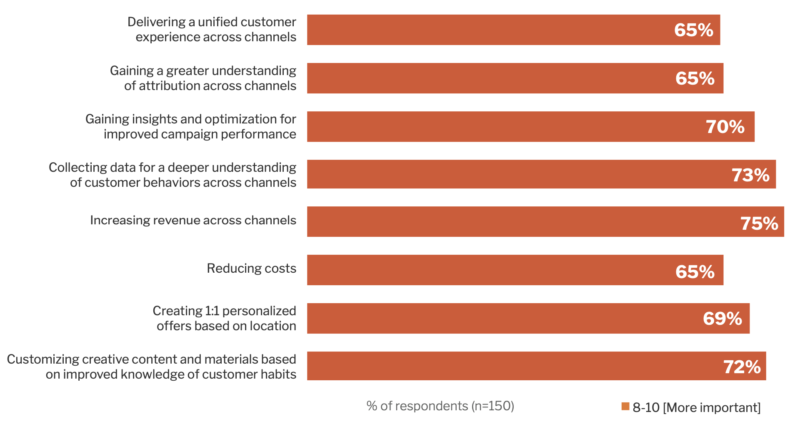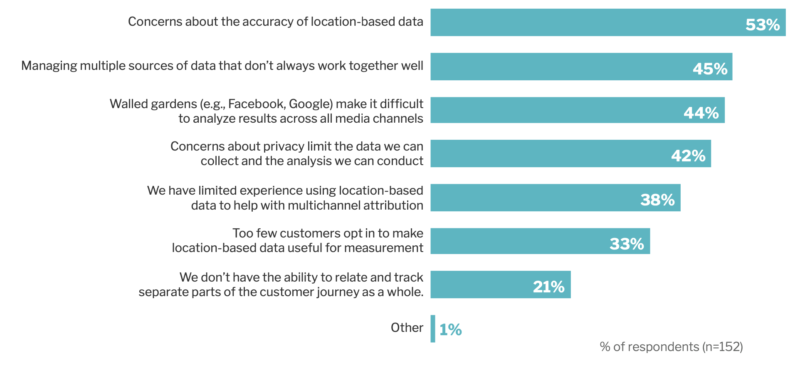From ‘where’ to ‘why’: Marketers’ use of location data becoming increasingly sophisticated
But numerous operational challenges stand in the way of full utilization.
According to data from 451 Research, 98% of marketers surveyed said they were now working with location data in some form. Beyond this, they’re moving from basic uses (geo-targeted ads) to increasingly sophisticated use cases such as audience insights, personalization and attribution.
Changing location-data mindset. Time is a key variable in how companies think about the utility of location. “Instead of trying to reach consumers at the moment when they cross a threshold into an advertiser’s location, modern campaigns focus on re-engaging infrequent visitors, finding new customers to win market share, or rewarding loyal ones,” writes 451 in a report called “Finding Real Enterprise Value in Location Data,” commissioned by Cuebiq.
The report identifies five stages of sophistication regarding location-data utilization:
- Planning. These companies are just getting started, either by exploring different options or putting together ideas or proofs of concept to determine what might work in their organization.
- A defined set of goals and plans, focused on an organized process for leveraging location data, and a solid understanding of the benefits (and how to measure them).
- Managed processes that is based on a formal program for incorporating location data into marketing plans.
- Strong, quantifiably measured program, with metrics that measure business outcomes.
- Fully mature, leading-edge company that uses location data for sophisticated tasks like attribution, audience targeting and analytics, and considers itself to be best in class among its competitors.
While many marketers surveyed expressed a desire to integrate online and offline data, there are numerous operational challenges standing in the way. This is partly about the limitations of their technology infrastructures and partly about the challenges of integrating data sets with differing collection methodologies.
Rate the importance of the following goals in an integrated marketing program across both physical and digital channels.

Internal and external challenges. Among a set of internal, organizational challenges were the following:
- Convincing colleagues of the efficacy of new technology use cases
- Budget constraints and lack of executive buy-in
- Lack of required technology investments
- Internal debates about resource allocation
Another significant challenge to utilizing location data is privacy. The report found that for 61% of large organizations privacy was a “major concern.” A related issue is data quality. That’s because privacy may impact the availability of high-quality location data in the future.
A slight majority of survey respondents expressed concern about “the accuracy of location-based data.” This was the top answer in response to a question about the challenges marketers face in measuring the efficacy of programs using location data. Yet the underlying issue may not be a measurement challenge so much as a vendor selection challenge: understanding which vendors have better data.
What challenges do you encounter in measuring the outcomes of programs using location-based data?

Why we care. Location and real-world behavioral data yields insights into audience identity, brand affinities and purchase intent, among other benefits. Location data offers more accurate consumer insights, very often than online data. Indeed, mobile-location data is often seen as a replacement for cookies. What’s perhaps most illuminating about the study is the light it shines on organizational challenges in acquiring (read: budget) and integrating the data, which are reflective of common digital marketing challenges more generally.
Contributing authors are invited to create content for MarTech and are chosen for their expertise and contribution to the martech community. Our contributors work under the oversight of the editorial staff and contributions are checked for quality and relevance to our readers. MarTech is owned by Semrush. Contributor was not asked to make any direct or indirect mentions of Semrush. The opinions they express are their own.
Related stories
New on MarTech